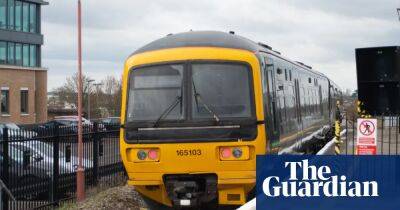UK rail strikes: what would a deal mean for passengers, unions and operators?
After 23 days of national strikes, two years of talking and hundreds of thousands of cancelled trains, rail workers are contemplating a pay rise that barely catches the coat tails of inflation. The rail industry’s biggest industrial dispute in decades may be approaching its final chapter – but with little chance of a happy ending for anyone involved.
The pain for passengers is not yet over – four more 24-hour strikes across 14 operators by train and station staff in the biggest rail union, the RMT, start next Thursday, 16 March.
But the most disruptive strike action, by Network Rail employees, has been called off, and the RMT has now put a pay deal to a referendum of affected members – including thousands of signallers with the power to bring the whole rail network to a halt.
Voting started on Thursday and ends on 20 March on what the union calls a new, improved offer, but in broad terms – 9% over two years – looks little different from the one its national executive committee rejected last month, or another that failed to win a vote before Christmas.
But Network Rail is confident that the tweaks, incentives and explanations it has provided will sway the few thousand more staff needed to clear the 50% hurdle.
The train companies are further from resolution – with the crises at First Group-owned TransPennine and Avanti underscoring troubled industrial relations.
The deal that their train crew and station staff – but not drivers – have been offered has the same headline figures as Network Rail.
But the valuable perk of hugely discounted rail travel is one most train company staff already enjoy. And with ticket offices facing wholesale closure, a promise of no compulsory redundancies until 2025 looks like just a short stay of
Read more on theguardian.com


![Decentraland [MANA] short-term traders can look to buy at… - ambcrypto.com](https://finance-news.co/storage/thumbs_400/img/2023/3/20/60668_qei4s.jpg)
![Analyzing weekly performance of Decentraland [MANA], and SAND - ambcrypto.com - city Sandbox](https://finance-news.co/storage/thumbs_400/img/2023/3/20/60658_cfmo.jpg)










![Bitcoin [BTC] strikes careful balance with the ascent of these two metrics - ambcrypto.com - city Santiment - Beyond](https://finance-news.co/storage/thumbs_400/img/2023/3/17/60371_gcrp.jpg)


